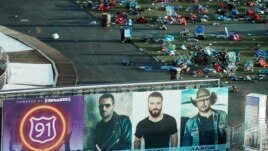30 September 2022
A new documentary series examines the worst mass shooting in American history through witness reports, videos and other material.
11 Minutes is a telling of the 2017 massacre at a country music festival in Las Vegas, Nevada, and how it affected people who were there. The film is more than three hours long and appearing in four parts on the Paramount+ streaming service.
"I've never felt more useful or more like the universe put me exactly where I was supposed to be," said Ashley Hoff, a survivor of the attack and lead producer of 11 Minutes.

FILE - Personal belongings and debris litter the Route 91 Harvest festival grounds across the street from the Mandalay Bay resort and casino in Las Vegas on Oct. 3, 2017, after a mass shooting Oct. 1. (AP Photo/Marcio Jose Sanchez, File)
She was at the outdoor show on October 1, 2017, with her husband Shaun. They were watching Jason Aldean perform when they heard gunfire. They first thought it was fireworks.
But then, Hoff saw a bullet hit another concertgoer in the face. She and Shaun began running, dropping to the ground whenever they heard gunshots.
At one point, Hoff kicked off her cowboy boots so she could run faster. She and Shaun escaped to safety. The shooter, from high up in a hotel, killed 60 people and hurt more than 850 others.
Nine months later, an FBI agent was at Hoff's door with her boots — part of a little-known team that returns property left behind in such incidents. Hoff, who was already in the film business, thought the property return was an interesting subject. But she soon expanded on the idea.
Many survivors, like herself, were unhappy with media coverage of the shooting. They said they thought it was too concerned with the gunman instead of the victims.
"We all went back to our corners to suffer in silence," she said.
The film describes the event with cellphone and police body camera recordings. The cooperation of Las Vegas police was important to the production. The police provided video that shows medical teams racing to get injured people to hospitals. The film also includes video of special police bursting into the room where the gunman had barricaded, and then shot, himself.
The film presents the experiences of others at the event, including Jonathan Smith and Natalie Grumet. Both were seriously wounded in the attack.
"Is it easy to watch? No, but it shouldn't be easy to watch," said SiriusXM host Storme Warren, who was onstage in Las Vegas that night. "I don't know why you would tell the story if it were easy to watch."
Warren did not immediately agree to be part of the film. He was dealing with post-traumatic stress disorder (PTSD) as a result of the attack. He also was not pleased with past media coverage on the attack.
Hoff believes that her own experience that night, even though it is not included in the film, helped persuade some of those involved to talk.
After the shooting stopped, police talked of hearing the rings of cellphones, unanswered, as they walked among bodies still on the ground.
Along with concertgoers, 11 Minutes looks at the effects the violence had on emergency workers. "I was a very angry man. Very angry," paramedic operations chief Brian Rogers, said in the film.
Part four of 11 Minutes begins at daybreak, October 2, 2017. It centers on some of the lasting ties made among survivors and rescuers.
It is Hoff's favorite part of the series. "I do like to encourage people that there is goodness in the end, so hang in for that," she said.
"There are extraordinary acts of courage and human beings helping human beings," said Susan Zirinsky, chief of the See It Now Studios production company. "They're just regular people. In the darkest hours, people found each other."
Zirinsky, a former CBS News president, produced the critically praised documentary 9/11 about the 2001 terrorist attack in America. She considers 11 Minutes the most powerful film she's worked on since.
The gunman, who was dead when police reached him, was 64-year-old Stephen Paddock of Mesquite, Nevada. But, the filmmakers purposely did not identify him by name. Days before the shooting, Paddock had searched the internet for information on how to become a social media star.
Hoff did not want to give the killer any publicity.
The film ends by recognizing the names of victims of every mass shooting in the United States since the attack in Las Vegas.
"I don't call it a political statement," Zirinsky said. "I call it a statement of reality."
Both Hoff and her husband escaped the show without any gunshot wounds. Hoff had broken her arm when she fell while running. That is when she left her boots behind.
She did not notice her injury, however, until they reached safety.
Hoff hopes the film shows the depth of damage caused by mass shootings.
"We need to stop turning away, and we need to understand what going through this was like," she said. "It changes a person forever."
I'm Caty Weaver. And I'm Mario Ritter Jr.
The Associated Press reported this story. Caty Weaver adapted it for VOA Learning English.
_____________________________________________________________________
Words in This Story
documentary – n. a movie or television program that tells about real people or events
massacre –n. the violent killing of many people
barricade –v. to block or prevent others from entering a place
paramedic –n. a person whose job is to provide emergency medical care to people who are being taken to the hospital
regular –adj. normal or usual
encourage –v. to make people more hopeful